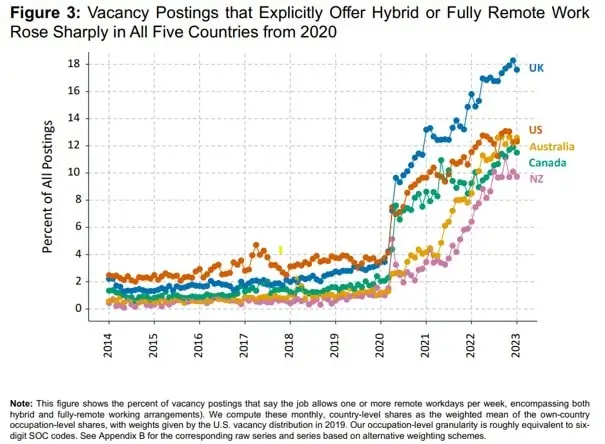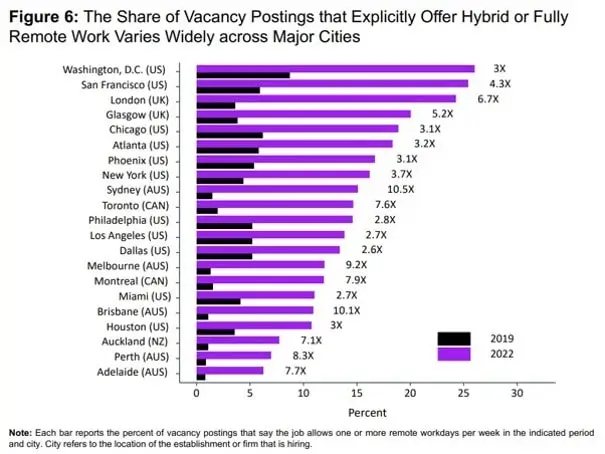The COVID-19 pandemic has sped up the move towards remote work in the UK, especially for small and medium-sized companies. According to a report by the CIPD, around 83% of UK companies now offer hybrid working, with 45% having a formal hybrid working policy and 24% having a more informal approach. Three out of five employees now have flexible working arrangements.
Remote work provides many benefits for UK SMEs, including lower overhead costs, more flexibility, and access to a broader range of talent. However, it also creates significant challenges, such as maintaining productivity, team unity, company culture, and cybersecurity.
The Changing Nature of Work From Home Jobs
Remote work is not new, but it has become more common and mainstream in recent years. According to a report by the Hybrid Work Commission, the number of remote jobs and hybrid working arrangements has been increasing for some time. Before the Covid pandemic, around 12% of adults said they had worked from home in the previous week.
After work-from-home guidance was lifted in Spring 2022, that number rose to 38%. In the three years since the pandemic began, the percentage who now have some form of hybrid work in place has climbed to 58%.
However, remote work is not a one-size-fits-all solution, and different UK SMEs may have different needs and preferences. Some may choose a fully remote model, where all employees have work-from-home jobs.
Others may prefer a hybrid model, where some employees work from the office and others from home or alternate between the two. And some may stick to a traditional office-based model, with remote work only allowed occasionally or for specific roles.
Clearly, some types of jobs do not easily allow working from home - for example, hospitality, manufacturing, healthcare, and retail jobs require an employee's physical presence in the workplace.
Collaboration & Productivity Marketplace Tools
These links go through to the marketplace profile page, which contains an affiliate link, meaning we get a small commission if you decide to make a purchase. It is at no cost to you.

Notion
Notion is an all-in-one workspace that can help you to organize your thoughts, manage your tasks, and collaborate with your team in a single place. With Notion, you can create notes, to-do lists, calendars, databases, and more. Notion is the perfect tool for businesses of all sizes, and it's free to get started.

SmartSuite
SmartSuite is an all-in-one work management platform that helps teams of all sizes plan, track, and manage their work more efficiently. With SmartSuite, teams can create custom workflows, automate tasks, and collaborate seamlessly.
Productivity in the Remote Job Era
One of the main worries about remote work is its effect on productivity. Many employers and employees wonder if working from home can impact the quality and amount of work output and the ability to meet deadlines and goals.
The answer is not straightforward, as productivity depends on many factors, including the type of work, employee preferences and habits, availability of practical tools and resources, and management support.
According to the Hybrid Work Commission report, business owners' views on the best work setting for productivity varied. Around 33% believed remote work improved productivity, while 32% favoured in-office work. The remaining one-third saw no significant difference in productivity between the two setups.
These views closely matched the company's work structure. Business owners with fully remote teams overwhelmingly saw remote work as more productive (54%). But this belief decreased among those with hybrid work models (35%) and fully in-person work (22%).
The CIPD report echoes this - 38% of organisations say more remote/hybrid work has increased productivity, while only 13% say it has decreased.
Employees generally favour some remote work arrangements.
The reasons they give include:
- Increased flexibility and control over schedule and pace
- Fewer distractions from the office
- Better work-life balance and wellbeing
- Improved communication and collaboration
- Difficulty separating work and personal life
- Lack of social interaction and isolation
- Technical issues and cyber risks
- Insufficient equipment and workspace

To maximise productivity, SMEs need tools and strategies to monitor, measure, and improve remote workers' output and performance.
Helpful approaches can include:Cloud-based software for remote access, collaboration and work integration
Clear, realistic goals and regular feedback
Regular schedule and breaks to avoid burnout
Training and support on tools, technologies and remote work challenges
Advice on creating a comfortable home workspace with good internet and security
Against a backdrop of acute skills and labour shortages in the UK, flexible working is a valuable tool for businesses seeking to attract and retain talented staff.
Team Dynamics and Company Culture
Another challenge with remote work is maintaining strong team dynamics and company culture. Remote work can impact social and emotional factors like trust, communication, collaboration, and engagement. These are important for building a united, productive team and a positive company culture.
In the CIPD report, employers listed their top issues with hybrid/remote work:
- Getting people back to the office when needed (42%)
- Managers overseeing remote teams' wellbeing and performance (41%)
- Impact on collaboration and creativity (35%)
- Technology/connectivity problems (33%)
- The effect on culture (26%)
To address these, SMEs could consider strategies like:Frequent, effective video calls and chats to communicate clearly, respectfully and inclusively with remote staff
Virtual team-building activities and social events like games, quizzes, coffee breaks and happy hours encourage camaraderie and fun.
Getting feedback and input from remote staff and involving them in decisions and problem-solving
Reinforcing the company vision, mission and values, celebrating team/company achievements
Providing learning and development opportunities and promoting a culture of innovation and creativity
The aim is to foster engagement and unity among distributed team members through ongoing communication, collaboration and recognition. This can help sustain a positive culture even when working remotely.
Technology: Enabler of Remote Work
Technology is critical for enabling remote work by providing the tools and solutions that make it possible and effective. Without technology, remote work would be impractical since workers couldn't access, share or collaborate on work. Managers also couldn't monitor, evaluate or support remote workers.
According to the CIPD report, organisations are looking to increase investment in technology to facilitate more hybrid or remote work. 40% aim to invest in both the quality and quantity of technology, as "technology/connectivity issues" are one of the top challenges (33%) employers face with increased work-from-home or hybrid work.
Some essential technologies for remote work:Collaboration tools like Microsoft Teams, Slack, Zoom, Google Workspace and Asana enable remote workers to work together on projects, communicate and coordinate.
Cybersecurity solutions like VPNs, antivirus software, firewalls and encryption tools protect remote workers from cyberattacks, data breaches and ensure privacy.
Cloud computing allows remote workers to access, store and process data and applications over the Internet rather than local devices. This enables working anywhere, anytime, on any device and scaling resources as needed.
Technology facilitates remote work and drives innovation and change as it constantly evolves and creates new possibilities.

Digital Office Marketplace
Discover a wide range of tools that can help with your digital transformation. Build your digital office to facilitate a work from home environment that works for your business and your employees.

AI Marketplace
The rapid advances in Artificial Intelligence give your business the tools that can power your business growth and productivity. They can help level the business landscape for SMEs.
Some future tech trends that may influence remote work:Artificial intelligence (AI) can automate processes like data analysis, customer service and content creation. It provides insights to improve performance.
Internet of Things (IoT) creates a smart, connected work environment where remote workers can monitor devices and access real-time data.
Virtual reality (VR) and augmented reality (AR) provide immersive, interactive experiences that enable remote workers to collaborate and train in engaging new ways.

 Source:
Source: REMOTE WORK ACROSS JOBS, COMPANIES, AND SPACE
NATIONAL BUREAU OF ECONOMIC RESEARCH
Cambridge, MA 02138
March 2023
Balancing Flexibility and Structure
One of the main benefits of remote work is the flexibility it gives remote workers to choose when, where and how they work based on their preferences and needs. However, too much flexibility can also be a downside, leading to a lack of structure and discipline, affecting consistency and work quality.
Therefore, remote work requires a balance between flexibility and structure, where remote workers benefit from flexible arrangements while meeting expected standards and responsibilities.
This balance can be achieved by:A clear, consistent remote work policy and guidelines outlining remote workers' and managers' roles, responsibilities, rules and regulations, such as working hours, availability, communication and accountability.
Creating a regular, predictable work routine and schedule and sticking to it as much as possible.
Setting and communicating clear, realistic goals and deadlines, and tracking and reporting on progress and results.
Having a dedicated, comfortable workspace at home minimises distractions and interruptions from family, pets or other sources.
Taking breaks and time off from work, and maintaining a healthy work-life balance.
Remote Work and Business Growth
Remote work can also positively impact UK SMEs' growth and ability to scale by creating new opportunities and advantages.
Some ways remote work can boost business growth:Accessing a broader, more diverse talent pool: Remote work allows SMEs to hire and retain the best talent regardless of location, background, or availability. This helps SMEs find the right skills and experience and increase workforce diversity and inclusion. 51% of businesses said hybrid roles increased hiring people from different regions, 53% hiring parents/caregivers, and 42% hiring those with a disability (Hybrid Work Commission report).
Expanding market reach and customer base: Remote work enables SMEs to operate and serve customers across regions and countries without needing a physical presence or infrastructure. This can increase brand awareness and visibility and access new, untapped markets.
Reducing costs and increasing efficiency: Remote work can help SMEs save on things like office space, utilities, travel, and reinvest in other business areas. It can also increase efficiency and productivity by reducing commute times, absenteeism, and turnover, and improving employee satisfaction and loyalty.
Challenges and Solutions
Despite the benefits, SMEs may need help implementing and managing remote work.
Some common challenges and solutions:Managing performance and quality: Remote work can make it harder for SMEs to monitor and evaluate remote workers' performance and ensure they meet expectations.
SMEs need tools to track and measure remote work output/outcomes, like key performance indicators (KPIs), surveys, and reviews. They must also give regular, constructive feedback and promptly address any issues.
Ensuring cybersecurity and compliance: Remote work can expose SMEs to cyber risks as workers may use unsecured devices and networks or access sensitive data remotely. SMEs need strict cybersecurity/compliance policies, training to protect devices/data, and solutions like VPNs, antivirus, firewalls and encryption.
Maintaining employee wellbeing and mental health: Remote work can cause stress, isolation, loneliness or burnout. A Capgemini report found that over half of employees feel burned out by remote work, rising to 61% for younger workers aged 31-40. Employees worry about constant pressure to be "always on" and feel micromanaged.
New hires need help to connect remotely - half would leave if remote work were the only option. SMEs need to promote a culture of care/support and give resources to help with remote work pressures. They should encourage workers to manage their health and maintain work-life balance.
Ensuring equal treatment of remote workers: 39% of employers are concerned that those working from home may be treated differently in career development/progression versus in-office staff.
However, only 20% of employees expressed this concern about less favourable treatment for spending less time in the office (CIPD report).
Future Outlook
Remote work is not temporary or optional but a permanent reality for UK SMEs. 71% of employees say flexible working is important, 12% have changed careers due to lack of flexibility, and 6% have left jobs (CIPD report).
Remote work offers SMEs benefits like increased productivity, flexibility and scalability. But it also brings challenges like maintaining quality, security and culture.
The future of remote work is uncertain and dynamic, subject to factors like technology, laws, competition and customer demand. Major companies like Amazon, Zoom and Meta now require regular office days (3 per week).
A
Hays recruitment survey found more people now work full-time in an office (43%) than hybrid (39%). In the private sector, 42% work hybrid versus 31% in the public sector. 24% of employers want staff to spend more time in the workplace.
SMEs need to balance the pros and cons of remote work, adopting tools and strategies to optimise it. They must invest in technologies enabling remote work and develop skills to support and sustain it. The future of work for SMEs is remote, so they must be ready and prepared.
References:Flexible and hybrid working practices in 2023Employer and employee perspectives
May 2023
Chartered Institute of Personnel and Development
https://www.cipd.org/uk/knowledge/reports/flexible-hybrid-working-2023/Hybrid Work Commission 2023August 2023
https://www.publicfirst.co.uk/hybrid-work-commission-report.htmlThe Future of work: From remote to hybridCapgemini
https://www.capgemini.com/wp-content/uploads/2022/04/The-Future-of-Work_Final.pdfFurther Reading:The rise of hybrid working: How to transform your organisation for our changed worldPwC
https://www.pwc.co.uk/issues/transformation/case-studies-and-insights/the-rise-of-hybrid-working.htmlState of Hybrid Work 2023Owl Labs
https://owllabs.co.uk/state-of-hybrid-work/2023/Hybrid working: Guidance for people professionalsCIPD
https://www.cipd.org/uk/knowledge/guides/planning-hybrid-working/An employer’s guide to hybrid workingFitzgerald HR, October 2023
https://www.fitzgeraldhr.co.uk/hybrid-workingUK employees spend just 1.6 per days a week in the office, research shows – but is that a problem for employers?People Management
https://www.peoplemanagement.co.uk/article/1833600/uk-employees-spend-just-16-per-days-week-office-research-shows-%E2%80%93-problem-employersTide turns on hybrid working: less than two in five working in a hybrid wayHays
October 2023
https://www.hays.co.uk/media-centre/press-releases/content/employers-missing-a-trick-by-not-including-flexible-workingCloud Is The Future of the Workspace Capgemini
(registration required to download report)
https://www.capgemini.com/insights/research-library/cloud-is-the-future-of-the-workspace/ 






